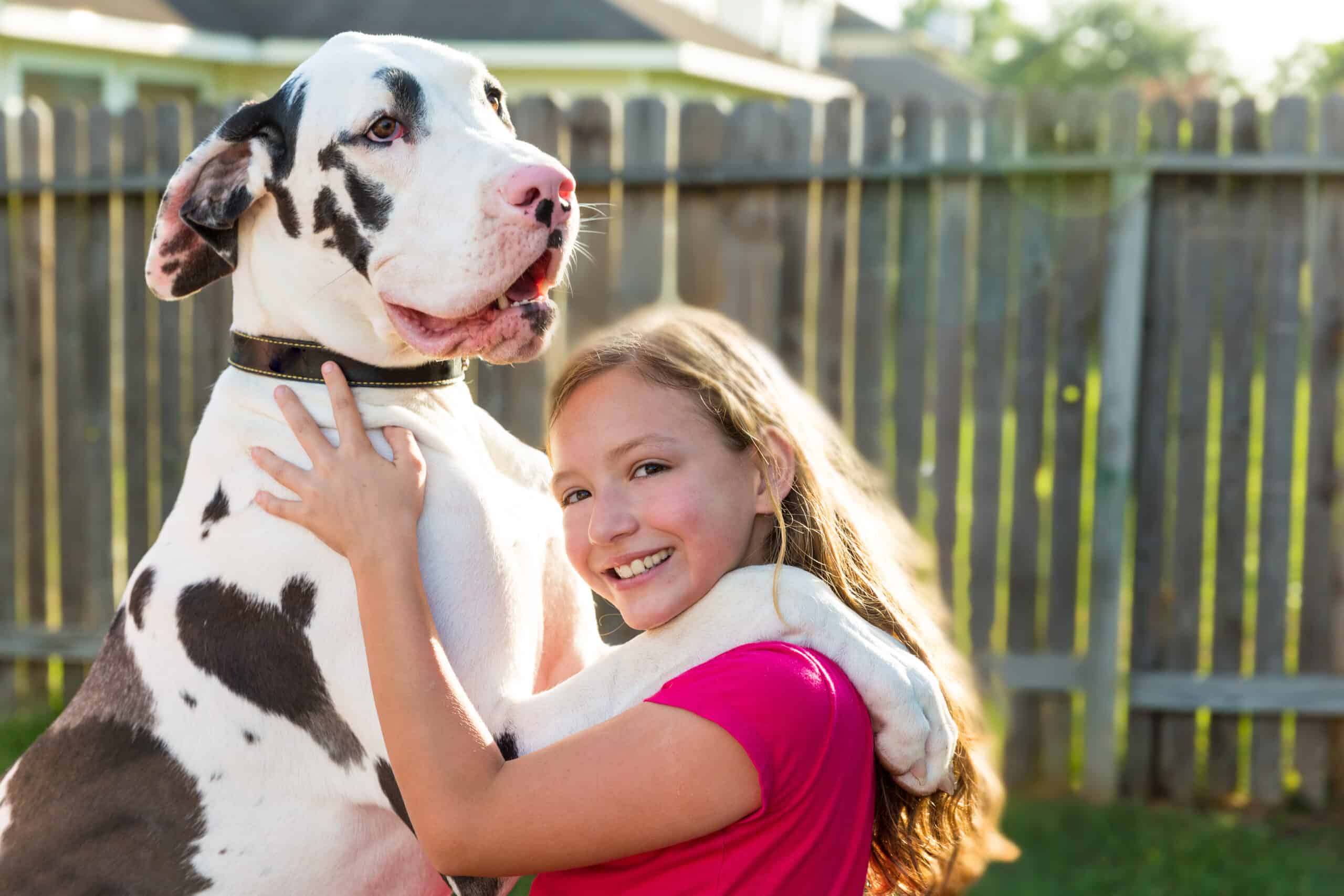Great Danes are known for their towering height and massive size, but are Great Danes good family dogs?
Many people are drawn to this breed for their gentle and affectionate nature, but it’s important to consider whether their needs and temperament are a good match for your family.
Despite their intimidating appearance, Great Danes are often described as “gentle giants” and can be excellent family pets.
They are generally patient and tolerant with children, and their laid-back personality makes them well-suited for households with a relaxed atmosphere.
However, their size can be a concern for families with young children, as they may accidentally knock over or step on a child during playtime.
When considering a Great Dane as a family pet, it’s important to keep in mind that they require plenty of space and exercise.
These dogs are not well-suited for apartment living and need a large yard to run and play in.
They also thrive on human companionship and may become destructive or anxious if left alone for long periods of time.
Overall, while Great Danes can make wonderful family pets, it’s important to carefully consider their needs and temperament before bringing one into your home.
Table of Contents
Great Dane Overview
The Great Dane is a gentle giant of the dog world, known for its massive size and height.
This breed has its origins in Germany, where it was bred as a hunting dog and later as a protector of estates.
The Great Dane is also known as the “Apollo of Dogs” due to its majestic appearance.
Great Danes are a mastiff-type breed and belong to the working group of dogs. They are intelligent, loyal, and have a friendly disposition, making them great family pets.
They are also known for their regal and elegant appearance, which adds to their charm.
The Great Dane is a giant breed, standing at least 30 inches tall at the shoulder and weighing between 100 and 200 pounds.
Despite their size, they are typically easygoing and mild-mannered.
They require moderate exercise but do need space and shouldn’t be cramped into studio apartments and postage-stamp yards.
Above all, this sociable breed needs companionship and doesn’t do well when left alone.
Physical Characteristics
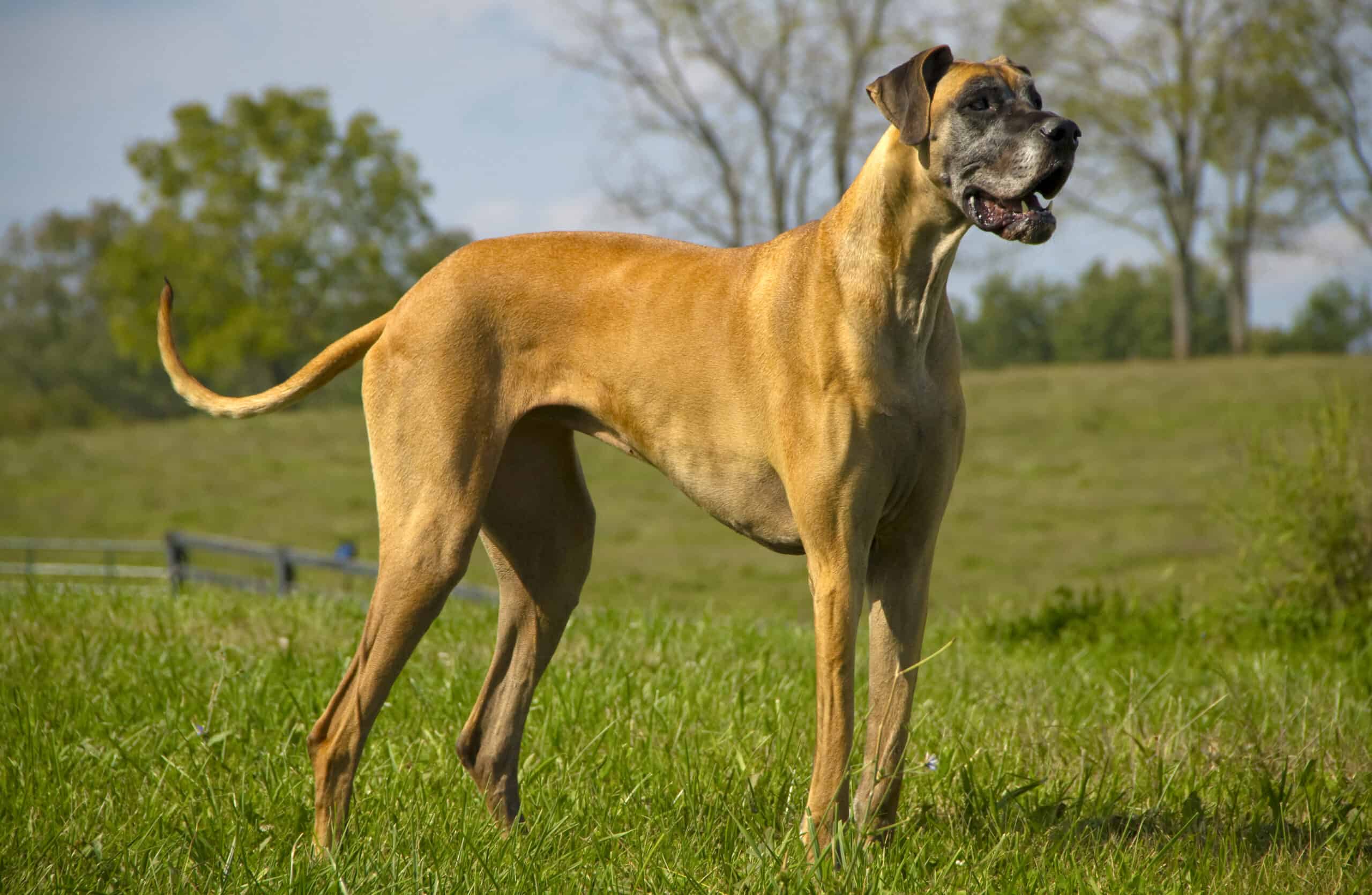
Size and Weight
Great Danes are known for their giant size and tall stature.
They are one of the largest dog breeds, with males typically standing between 30 and 34 inches tall at the shoulder and weighing between 120 and 200 pounds.
Females are slightly smaller, standing between 28 and 32 inches tall and weighing between 100 and 130 pounds.
Their long limbs and lean build give them an elegant appearance.
Coat and Colors
Great Danes have a short, smooth coat that requires minimal grooming. They come in a variety of colors, including fawn, brindle, blue, black, harlequin, and mantle.
Fawn
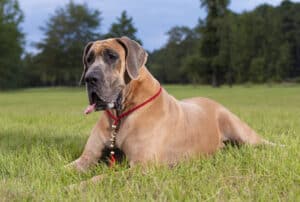
Fawn is the most common color, with a golden-yellow coat and black mask.
Brindle
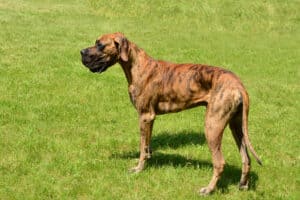
Brindle is a striped pattern of black and fawn.
Blue
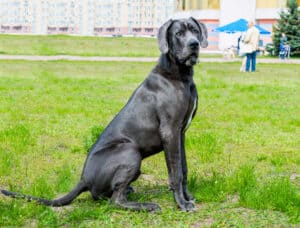
Blue is a solid gray-blue color.
Black
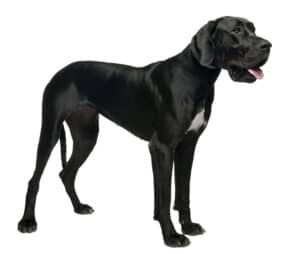
Black is a solid black coat.
Harlequin
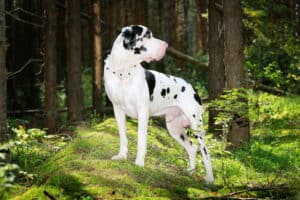
Harlequin is a white coat with black spots.
Mantle
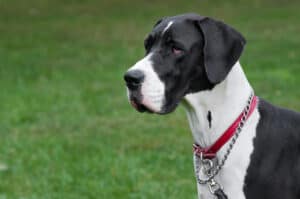
Mantle is a black and white coat with a black “blanket” over the body.
Great Danes have floppy ears that naturally hang down, adding to their friendly appearance.
They also have a tendency to drool, so it’s important to keep a towel handy.
Temperament and Personality Traits – Are Great Danes Good Family Dogs?
Great Danes are known for their gentle and friendly temperament, which makes them great family dogs.
They are often referred to as “gentle giants” due to their imposing size but laid-back personality.
Behavior with Family
Great Danes are loyal and content dogs that enjoy nothing more than to hang out with their families on the couch.
They are affectionate and friendly with most people, and their unique personality traits make them great family pets.
They are sensitive to their owner’s moods and will often adapt their behavior accordingly.
They are also strong-willed and protective, which makes them excellent guard dogs.
Great Danes are known to be good with children, but they should always be supervised around kids due to their size.
They are generally friendly and patient with kids, but their rambunctious nature can sometimes cause them to accidentally knock over small children.
Interaction with Other Dogs
Great Danes are social dogs that require socialization from an early age.
They are generally friendly with other dogs, but they can be dominant and may react aggressively towards other dogs if they feel threatened.
It is important to socialize Great Danes with other dogs from an early age to prevent any aggressive behavior.
Great Danes are strong and imposing dogs, and they can be intimidating to other dogs due to their size.
However, with proper socialization, they can learn to be friendly and get along with other dogs.
Training and Socialization
Great Danes are intelligent dogs that are eager to please their owners.
They respond well to positive reinforcement training techniques, and early training is essential to ensure they grow up to be well-behaved family pets.
Puppy Training
Puppies should be trained as soon as they join the family. Basic obedience training, such as teaching them to sit, stay, and come when called, should begin when they are around 6-8 weeks old.
Crate training can also be started at this age to help with potty training and to give them a safe space to retreat to when they need some alone time.
It is important to set clear boundaries for your Great Dane puppy and to be consistent with training.
They are sensitive dogs and respond best to gentle, positive reinforcement techniques.
Harsh training methods can cause them to become fearful or aggressive.
Socialization Needs
Great Danes are social dogs that thrive on human companionship.
They also need to be socialized with other dogs and animals from a young age to prevent them from becoming overly protective or aggressive.
Puppy socialization classes are a great way to expose your Great Dane puppy to new experiences and to help them develop good social skills.
It is important to remember that Great Danes are large dogs and can unintentionally knock over small children or elderly individuals.
They should be supervised when interacting with young children and taught to be gentle.
Regular exercise and playtime are important for Great Danes to keep them healthy and happy.
They have moderate exercise needs and enjoy going for walks or playing in a securely fenced yard.
To sum up, Great Danes are trainable and social dogs that can make excellent family pets with proper training and socialization.
Health and Lifespan
Great Danes are generally healthy dogs, but like all breeds, they are prone to certain health issues.
This section will cover some of the most common health issues that Great Danes may face, as well as their lifespan and aging process.
Common Health Issues
Great Danes are a large breed, which means they are at risk for certain health problems.
One of the most serious health issues that Great Danes face is bloat, which is a life-threatening condition where the stomach fills with gas and twists on itself.
Other common health issues that Great Danes may face include hip dysplasia, wobbler syndrome, and dilated cardiomyopathy.
Hip dysplasia is a condition where the hip joint does not develop properly, which can lead to arthritis and pain.
Wobbler syndrome is a condition where the spinal cord is compressed, which can cause weakness and uncoordinated movements.
Dilated cardiomyopathy is a heart disease that can cause the heart to become enlarged, which can lead to heart failure.
In addition to these health problems, Great Danes are also at a higher risk for certain types of cancer, such as osteosarcoma and lymphoma.
Lifespan and Aging
Great Danes have a relatively short lifespan compared to other breeds. On average, Great Danes live between 8 and 10 years, although some may live as long as 12 years.
This short lifespan is due in part to their large size, which puts additional strain on their bodies.
As Great Danes age, they may experience a decline in mobility and energy levels. They may also be at a higher risk for certain health problems, such as arthritis and heart disease.
It is important for owners to monitor their Great Dane’s health closely as they age and to provide them with the appropriate care and treatment to ensure they remain healthy and comfortable.
Care and Maintenance
Great Danes are gentle giants that make excellent family pets. However, they require proper care and maintenance to ensure their health and happiness.
In this section, we will discuss the exercise, grooming, and nutrition needs of Great Danes.
Exercise and Energy Level
Great Danes are large dogs that require regular exercise to maintain their health and energy levels.
They have moderate exercise needs and should be taken for a walk at least twice a day.
They also enjoy playing fetch and tug-of-war. However, it is important not to over-exercise them, especially when they are young, as their bones and joints are still developing.
Grooming and Hygiene
Great Danes have a short, smooth coat that requires minimal grooming. They shed moderately, so regular brushing can help reduce shedding and keep their coat shiny and healthy.
They also have a tendency to drool and slobber, so keeping a towel handy is a good idea.
Great Danes also require regular nail trimming and teeth cleaning to maintain their overall hygiene.
Nutrition and Diet
Great Danes are large dogs that require a balanced diet to maintain their health. They should be fed a high-quality dog food that is appropriate for their size and age.
It is important not to overfeed them, as they are prone to obesity.
Great Danes also have a tendency to develop separation anxiety, so it is important to establish a regular feeding schedule and avoid leaving them alone for long periods of time.
Cost of Owning a Great Dane
Great Danes are one of the largest dog breeds, and as such, their cost of ownership can be quite high.
According to PetBudget, the average cost of owning a Great Dane throughout its lifetime is $20,015.
This includes essential expenses such as supplies, training, medical costs, food, treats, grooming expenses, licensing, and microchip.
One of the biggest expenses associated with Great Danes is their food. Due to their size, they require a significant amount of food each day.
On average, a Great Dane will eat around 10 cups of food per day, which can cost upwards of $100 per month.
It’s important to note that the cost of food can vary depending on the quality of the food.
Another expense to consider when owning a Great Dane is medical costs. Great Danes are prone to certain health issues, such as hip dysplasia and bloat, which can be costly to treat.
It’s recommended to have a savings account specifically for unexpected medical expenses.
Grooming expenses can also add up when owning a Great Dane. They have short hair, but they shed a lot, which means they require regular brushing and grooming.
It’s important to factor in the cost of grooming tools and professional grooming services.
Conclusion
Great Danes are known as “gentle giants” and make excellent family dogs due to their calm and affectionate nature.
They are patient with children and can handle roughhousing more than other dogs of similar size.
While they do require space to move around, they don’t need excessive exercise.
Great Danes enjoy lounging around the house and can even pass as giant lap dogs with their family members.
Additionally, Great Danes have easygoing temperaments and loving personalities.
They are loyal, intelligent, and affectionate, making them great companions for people going through tough times.
Overall, if you’re looking for a friendly and gentle giant to welcome into your home, a Great Dane might be the perfect addition to your family.
However, it’s important to remember that every dog is an individual, and their personality and behavior can vary.
Proper training, socialization, and care are crucial to ensure a happy and healthy relationship between a Great Dane and their family.
Frequently Asked Questions
What is the temperament of Great Danes?
Great Danes are known for their friendly and gentle temperament. They are calm and patient with their family members and enjoy being around people.
They are also known for their protective nature, which makes them excellent watchdogs.
Do Great Danes get along with other dogs?
Great Danes can get along well with other dogs if they are socialized properly from a young age.
They are generally friendly and non-aggressive towards other dogs, but they can be dominant towards dogs of the same sex.
Are Great Danes good with children?
Great Danes are generally good with children and are known for their gentle nature.
They are patient and tolerant with children, but due to their large size, they should always be supervised when around small children.
How difficult are Great Danes to train?
Great Danes are intelligent and eager to please, but they can be stubborn at times.
They respond well to positive reinforcement training and should be trained using gentle methods.
Consistency and patience are key when training a Great Dane.
What are the maintenance requirements for Great Danes?
Great Danes have a short, smooth coat that requires minimal grooming. They should be brushed once a week to remove loose hair and keep their coat shiny.
They also require regular exercise to maintain their health and prevent obesity.
What is the average size of a Great Dane?
Great Danes are one of the largest dog breeds and can weigh up to 175 pounds.
Males are typically larger than females and can stand up to 32 inches tall at the shoulder.

